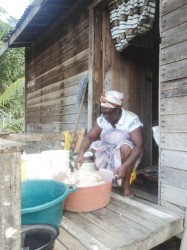By Lloyda Nicholas-Garrett
Emelda Collins belongs to that hardy breed of Guyanese women who understand only too well that life can sometimes be a prolonged struggle and that survival means waging that struggle on a sustained basis.
At 61, she is a survivor, though she understands only too well that there are no guarantees to the continuity of that condition. Every day life throws up another challenge and Collins has grown to understand that there is no option to overcoming those challenges and moving on. “You can’t do one thing in this country and survive,” she says. Collins salts and dries fish, which she then sells to subsidise her household’s income.

Her business is a decidedly modest enterprise, a small labour-intensive pursuit that is held together by a combination of her own determination and a market that comprises, primarily, a loyal Bourda Market vendor. As a businesswoman Collins lives on the edge.
There are no carefully created business plans and engagements with lending institutions. Collins’s salted fish business was born out of the necessity to help meet the needs of her family.
A mother of eight and a grandmother of 19, Collins has been processing and marketing fish for more than seven years. A friend taught her the art and today she makes just enough to ‘fill a hole’ in the tapestry of her family’s needs. At the prevailing rate, she will probably never be very far from the periphery. The business of salting and drying fish has been a go-to enterprise for persons ranging from medium and small-scale investors to micro enterprises operated by hardened hustlers. Collins’s pursuits fit into the smallest category.
When Stabroek Business visited Collins recently, she was elbow deep in what appeared to be about 90 pounds of mixed fish. Her home at Philomena Park, D’Urban Backlands, doubles as a factory. The road to the premises is a path defined by a grass track and muddy patches; some might say not the most convivial environment for doing business. After the fish is bought it must be thoroughly cleaned, cut into sizeable pieces and soaked in a solution of water and a small quantity of bleach. The solution, Emelda says, is intended to perform the twin functions of sterilising the fish and keeping flies away. Afterwards, each piece must be saturated with salt and left to soak for about three days before being put out to dry. The fish is left outdoors in a net contraption depending for the completion of the process on the vagaries of the weather. The fish is ready for market after it is completely dried.
“It’s not easy work. When the fish bones sticking you it makes you want to stop,” Collins says. She lives with her husband, a security guard, and one of her sons. She works alone. Her children are supportive in other respects, but all are preoccupied with their own pursuits and not particularly disposed to joining her in the venture.
The responsibility of running a modest enterprise can be burdensome. Collins describes how she purchases fish with returns garnered from the previous week’s takings, stressing the importance of careful management. “If you buy fish at a high price you may sometimes have to sell it at a low price anyway, just to retrieve your capital,” she said. Given the peaks and troughs of fish prices coupled with the consideration of competition, the uncertainties can sometimes be unbearable.
The biggest challenge reposes in retaining a market. Collins’s major market is a Bourda Market vendor. She explains that there is an eternal jousting match between herself and the vendor, over what the vendor says are “better prices” available elsewhere. These are delicate discourses, since the loss of this particular market could mean the disappearance of most of Collins’s income. Searching for additional markets is not an option at this juncture. That would mean increasing production and to do so she would have to increase her capital outlay, a pursuit that is altogether out of the question at this time. She dreams of being able to compete with the larger processors. But that would require investment in a vehicle, a pursuit which, at this time, is no more than a pipe dream. Rather than dream, she supplements her earnings by accepting occasional jobs as a cleaner.
Born at West Coast Berbice, Collins was taken to Linden as a child. Her father worked there with the bauxite company. It was there that she met and married her husband David. Though resigned to the struggle that is now her life she appears not to have given up on her aspiration of getting off the floor, rising, somehow, even if not to an exalted level at least to a place that allows her to feel a greater sense of accomplishment.








